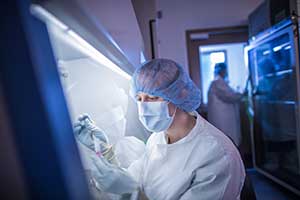CAR T-Cell Therapy for Cancer Treatment
Traditionally, the cornerstone of cancer treatment has been a plan that incorporates surgery, chemotherapy and/or radiation treatment. However, immunotherapy is a relatively new option that is showing increasing promise. Recent advances in the field of immunology have resulted in an enhanced understanding of the ways in which the body’s own immune system can be used to fight cancer. Specifically, immunotherapies such as CAR T seek to enhance the immune system’s ability to target and destroy cancerous cells.
What is CAR T-cell therapy?
 Much like all forms of cancer immunotherapy, CAR T-cell therapy seeks to strengthen and build upon the inherent cancer-fighting power of the body’s immune system. This treatment involves giving patients modified versions of their own immune system T cells, which are white blood cells that help protect the body from illnesses and infections.
Much like all forms of cancer immunotherapy, CAR T-cell therapy seeks to strengthen and build upon the inherent cancer-fighting power of the body’s immune system. This treatment involves giving patients modified versions of their own immune system T cells, which are white blood cells that help protect the body from illnesses and infections.
How CAR T-cell therapy works
Patients considering CAR T-cell therapy must undergo a number of screenings and tests to determine if it is an appropriate option. Those who are able to receive CAR T therapy can expect the following:
- Collection – To obtain T cells, a blood sample is withdrawn from the body. The T cells are then removed from the blood before the filtered blood is returned to the body. This process is called apheresis.
- Engineering – In a laboratory, the T cells are genetically engineered to express a specific protein, called chimeric antigen receptors (CARs), on their surface. This allows the T cells to recognize targeted tumor cells.
- Multiplication – Next, the genetically modified T cells are grown in a lab over the course of several weeks. By the end of this process, millions of T cells are frozen and sent to the hospital where the patient is receiving treatment.
- Conditioning therapy – Before the CAR T cells are infused, the patient may receive chemotherapy.
- Infusion – After the chemotherapy, the patient will be admitted to the hospital. The CAR T cells are then re-administered in a process that is similar to a blood transfusion.
- Recovery – Following the procedure, the patient will remain under close observation for two to three months. If any complications arise, hospitalization may be required for further treatment.
CAR T-cell therapy at Moffitt Cancer Center
Moffitt Cancer Center is one of only a few treatment centers that is certified to provide this promising cancer therapy. Currently, we are utilizing CAR T therapy to treat several types of blood and bone marrow cancers, offering a new source of hope and optimism to many patients. Our nationally recognized research team continues to explore new ways to use CAR T and other immunotherapies for cancer treatment, and we are making progress every day.
If you’d like to learn more about CAR T-cell therapy at Moffitt Cancer Center, call 1-888-663-3488 or complete our new patient registration form online.
